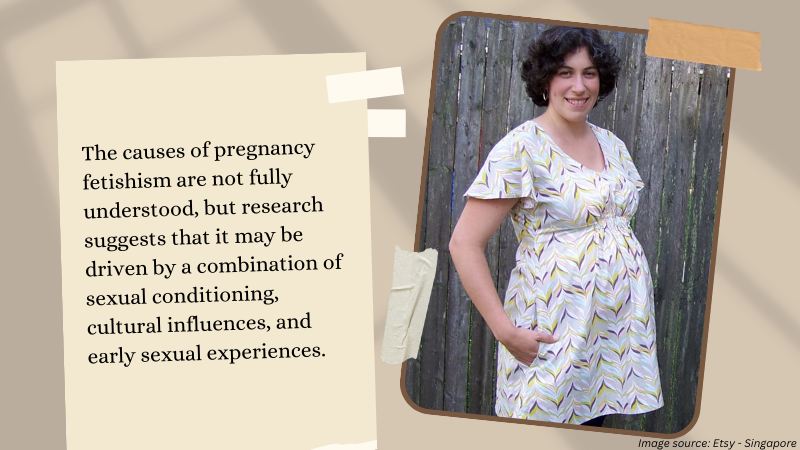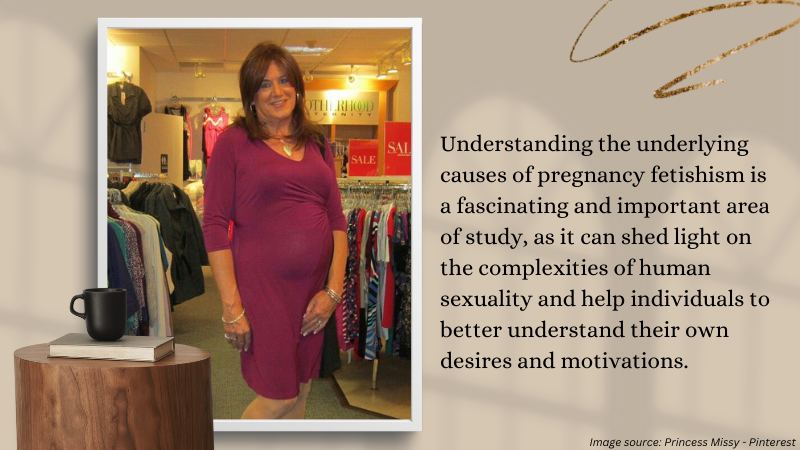The Psychology Behind Pregnancy Fetishism
Pregnancy fetishism, also known as maiesiophilia, is a type of sexual fetishism that involves a strong sexual attraction to pregnancy and the physical attributes associated with it.

Interestingly, some crossdressers have been known to enjoy this fetish, as it allows them to experience a sense of femininity and motherhood that may be difficult to achieve through other means. Understanding the psychological underpinnings of pregnancy fetishism can help shed light on why some crossdressers may be drawn to this fetish and how it can fulfill certain psychological needs and desires. What’s true is that pregnancy fetishism is driven by a combination of sexual conditioning, cultural influences, and early sexual experiences.
While some people may view this fetish as harmless or even normal, others may find it disturbing or inappropriate. Understanding the psychology behind pregnancy fetishism can help shed light on its causes and implications.
What is Pregnancy Fetishism?

Pregnancy fetishism, also known as maiesiophilia, is a sexual fetish in which an individual is sexually aroused by the idea of pregnancy or pregnant women. This fetish can manifest in various ways, such as through erotic fantasies, sexual roleplaying, or the consumption of pregnancy-related media. Some people may also have a fetish for lactation or childbirth.

Pregnancy fetishism is a relatively common fetish, but it is often stigmatized due to its association with pregnancy, which is traditionally viewed as a non-sexual and family-oriented experience. It’s important to note that having a fetish is not inherently problematic as long as it is consensual, safe, and does not cause harm to oneself or others. The psychology behind pregnancy fetishism is a fascinating and often misunderstood area of human sexuality. It is a complex phenomenon that has been linked to various psychological and emotional factors, including the desire for fertility, femininity, and vulnerability.
Crossdressers and Pregnancy Fetishism

For some crossdressers interested in pregnancy fetishism, wearing a prosthetic belly or other pregnancy-related clothing or accessories can help them better experience the fetish. A prosthetic belly is typically made of silicone or other materials. It is designed to mimic the appearance and texture of a pregnant belly. MtF crossdressers, in particular, may enjoy the feeling of wearing a prosthetic belly or other pregnancy-related clothing or accessories, which can enhance their experience of this fetish. For some crossdressers, engaging in pregnancy fetishism can be a way to explore their gender identity and express themselves in a safe and fulfilling manner.

This can allow crossdressers to experience a sense of physical femininity and motherhood that may be difficult to achieve otherwise. Additionally, wearing other pregnancy-related clothing or accessories such as maternity dresses, bras, and panties can help to enhance the experience of the fetish and allow crossdressers to fully immerse themselves in the role of a pregnant woman. It’s important to note that engaging in pregnancy fetishism, including the use of prosthetic bellies or other accessories, should always be done safely and consensually to ensure that both partners are comfortable and fulfilled.
What Causes Pregnancy Fetishism?

The causes of pregnancy fetishism are not fully understood, but research suggests that it may be driven by a combination of sexual conditioning, cultural influences, and early sexual experiences. Sexual conditioning refers to the process by which sexual preferences are formed through repeated exposure to particular stimuli. For example, a person who is exposed to images of pregnant women during puberty or early sexual experiences may develop a strong sexual association with pregnancy.

Pregnancy fetishism is considered a fetish rather than a sexual orientation because it is focused on a particular object or situation rather than a gender or sexual preference. However, some people may identify strongly with this fetish and incorporate it into their sexual identity and relationships. Understanding the underlying causes of pregnancy fetishism is a fascinating and important area of study, as it can shed light on the complexities of human sexuality and help individuals to better understand their own desires and motivations.
Cultural Influences

The cultural influences of pregnancy fetishism are multifaceted and complex. While this fetish is found across many cultures and has likely existed throughout history, cultural attitudes towards pregnancy and sexuality can shape the ways in which it is expressed and understood. For example, in cultures where motherhood is highly valued and respected, pregnancy fetishism may be viewed more positively as a celebration of femininity and fertility.

In contrast, in cultures where pregnancy is often stigmatized or seen as a private matter, pregnancy fetishism may be more taboo and associated with shame or guilt. Additionally, the media and popular culture can also play a role in shaping attitudes towards pregnancy fetishism, either by sensationalizing it or by portraying it in a more positive or accepting light. Overall, the cultural influences on pregnancy fetishism are complex and varied and can help to shape both the expression and reception of this fetish in different contexts.
Communicating Your Fetish in a Healthy Way

Communicating your fetish in a healthy way is an important part of any consensual sexual relationship. Here are some tips to effectively communicate your fetish. First, find the right time and place. Choose a time and place where you and your partner can have an open and honest conversation without interruptions or distractions. Next, be honest and clear: Clearly communicate your fetish and what it means to you. Use “I” statements to express your feelings and avoid placing blame or judgment on your partner. Also, listen to your partner. Be open to your partner’s response and listen to their thoughts and feelings without judgment. Show empathy and understanding of their perspective.

Moreover, negotiate boundaries. Discuss boundaries and expectations related to your fetish, including what is and is not okay and any safety precautions that may be necessary. Lastly, seek support. If you feel uncomfortable or anxious about sharing your fetish, seek support from a therapist or trusted friend. Remember that communication is key in any sexual relationship.

Be respectful, honest, and open with your partner, and be willing to listen and negotiate boundaries. By communicating your fetish in a healthy way, you can build a strong foundation of trust and intimacy in your relationship. If you have a pregnancy fetish, it’s important to communicate your desires and boundaries with sexual partners in a healthy and respectful way. Consent is crucial, and partners should be given the opportunity to opt-in or opt-out of any activities related to the fetish.
Consent and Boundaries

When engaging in pregnancy fetishism, it is important to establish clear boundaries with your partner. Both partners should be aware of what activities are and are not acceptable and what level of intensity is appropriate. For example, some individuals may not feel comfortable engaging in sexual activities during certain stages of pregnancy. In contrast, others may have specific preferences around the types of clothing or accessories they wear during the fetish activity.

It is also important to discuss any potential risks or complications associated with the fetish activity. For instance, sexual activities during pregnancy can carry risks of infection or injury, and it is essential to take appropriate precautions and engage in safe sexual practices. In addition to setting boundaries and discussing risks, obtaining explicit consent from your partner before engaging in pregnancy fetishism activities is crucial. Consent means that both partners have willingly and enthusiastically agreed to participate in the activity without any coercion or pressure from the other party.
Conclusion

Pregnancy fetishism is a complex and often misunderstood phenomenon. While it can be a source of sexual pleasure and satisfaction for some individuals, it’s important to understand the causes and implications of this fetish and to communicate desires and boundaries with sexual partners in a healthy and respectful way. By doing so, individuals can explore their sexuality in a safe and consensual manner.
Tagged With:Pregnancy Fetishism
- How Accepting Are Italian People of the Transgender Community?
- How to Embrace Authenticity as a Black Femboy Crossdresser.
- MTf Transgender Guide to Overcoming Transphobia and Transmisia
- How to Become a Feminine Man: Fashion & Personality
- Why Crossdressing Is Often Misunderstood: From A Crossdresser View
- Companions in Expression: The Role of Pets for Crossdressers
Established in 2009, We are a recognized manufacturer and seller of professional crossdressing products.
It is our aim to become not just the most creative manufacturer but also a very considerate seller, as we provide the best quality products for crossdressers all around the world.



















 Breast Forms
Breast Forms  Body Suit
Body Suit  Realistic Mask
Realistic Mask  Femini Girdle
Femini Girdle Hip & Butt Enhancement (8)
Hip & Butt Enhancement (8) Penis Prosthesis
Penis Prosthesis Fake Muscle
Fake Muscle Bikini
Bikini  Wig
Wig  Corsets
Corsets Course
Course service@roanyer.com
service@roanyer.com +8618652200711
+8618652200711 Facebook
Facebook YouTube
YouTube Twitter
Twitter Instagram
Instagram




